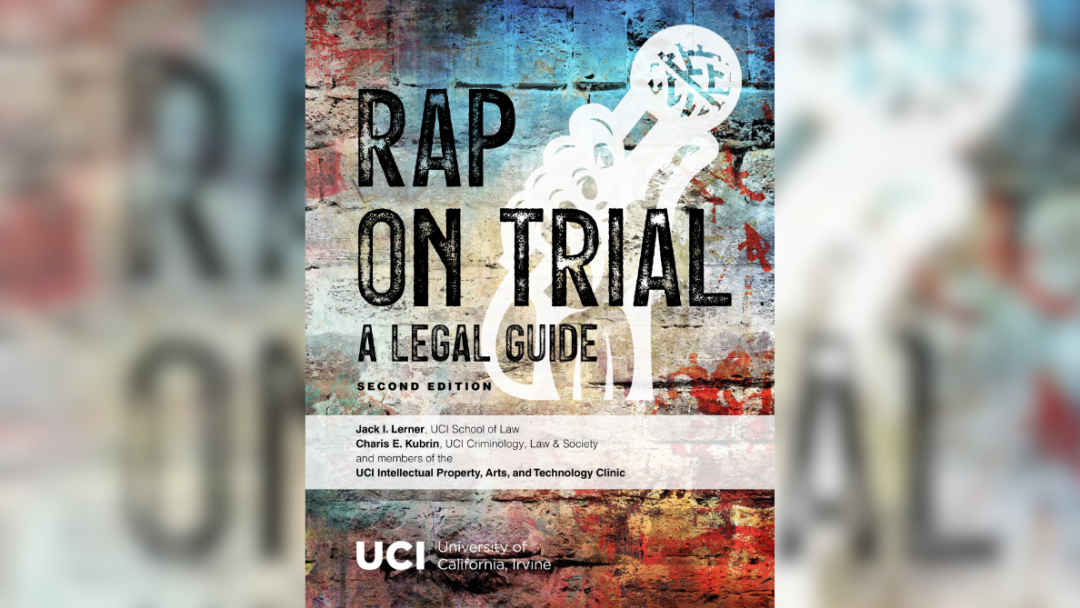
Manual includes legislative updates on use of rap lyrics in criminal prosecutions
The second edition of Rap on Trial: A Legal Guide was released today amid growing national concern and legislative developments regarding the use of rap lyrics in court.
Initially co-authored in 2021 by Jack Lerner, clinical professor of law at the University of California, Irvine and director of the UCI Intellectual Property, Arts, and Technology Clinic, and Charis Kubrin, UCI professor of criminology, law and society, the guide is a comprehensive resource addressing the intersection of First Amendment rights and racism in criminal cases involving musicians. Law students in the IPAT Clinic contributed substantially to the second edition through research, drafting and editing.
Rap on Trial has provided valuable guidance to the bar, the public and policymakers in navigating the problems that arise when prosecutors use artists’ creative expression against them in criminal trials. It serves as an in-depth manual for attorneys dealing with rap evidence at every stage of criminal proceedings, including initial discovery, trial and sentencing. The guide offers explanations of common rap conventions that may be unfamiliar to lawyers and jurors, an overview of empirical research on rap and bias, and analysis of evidentiary and First Amendment challenges to admitting lyrics into a trial. In addition, the authors provide a collection of cases involving rap evidence and a set of relevant court briefs.
“As we show in this new edition of Rap on Trial: A Legal Guide, media treatment of rap artists and their music has been overwhelmingly and relentlessly hostile,” Lerner said. “The use of rap lyrics in the courtroom weaponizes this history. In the process, it jeopardizes not just the right to a fair trial, but free speech and racial justice as well. We hope this update will advance efforts to fight this pernicious practice.”
Added Kubrin: “Our desire to update the guide was reinforced by feedback from attorneys all across the country who shared with us how much this resource has helped them with their cases.”
Building on version 1.1, the second edition of Rap on Trial incorporates new sections and revisions to reflect developments in the legal landscape and evolving perspectives on the issue. The guide now explores the impact of “cappin” disclaimers in rap songs, contains a cautionary note on the term “gangsta rap,” and delves into a new California law addressing rap lyrics and that law’s intersection with the California Racial Justice Act. Notably, the second edition also features a discussion on implicit bias, offering insights into its role in Rap on Trial cases and providing guidance to attorneys on mitigating its influence.
Recent legislative developments
In 2022, the California Legislature passed AB 2799, the Decriminalizing Artistic Expression Act, marking the nation’s first legislation to impose constraints on the use of rap lyrics in criminal cases. This landmark act explicitly recognizes the biases introduced by Rap on Trial and mandates that California courts consider social science research demonstrating these effects. Shortly after the law’s implementation, a California appellate court invoked it to overturn a conviction heavily reliant on a rap video. Similar legislation has been proposed at both the federal and state levels, including in New York, Louisiana and Illinois, showcasing a growing recognition of the need for legal safeguards.
Rap on Trial in recent high-profile cases
The second edition highlights recent high-profile cases – including the arrests of superstar rappers Young Thug and Gunna – in which numerous references were made to rap lyrics in the indictment. Additionally, an investigation in New York called “Operation Drilly” heavily relied on rap lyrics from the drill subgenre. These cases have brought heightened public attention to the persistent use of rap lyrics in criminal trials.
As the landscape surrounding this issue continues to evolve, Lerner and Kubrin encourage attorneys to utilize the periodically updated Rap on Trial case compendium and brief bank, featuring a recently added model motion in limine – a request made without the jury present – based on the Decriminalizing Artistic Expression Act. All resources, including the latest versions of the guide, compendium and brief bank, are accessible at https://ipat.law.uci.edu/endrapontrial.
Contact:
Mimi Ko Cruz
Director of Communications
949-824-1278